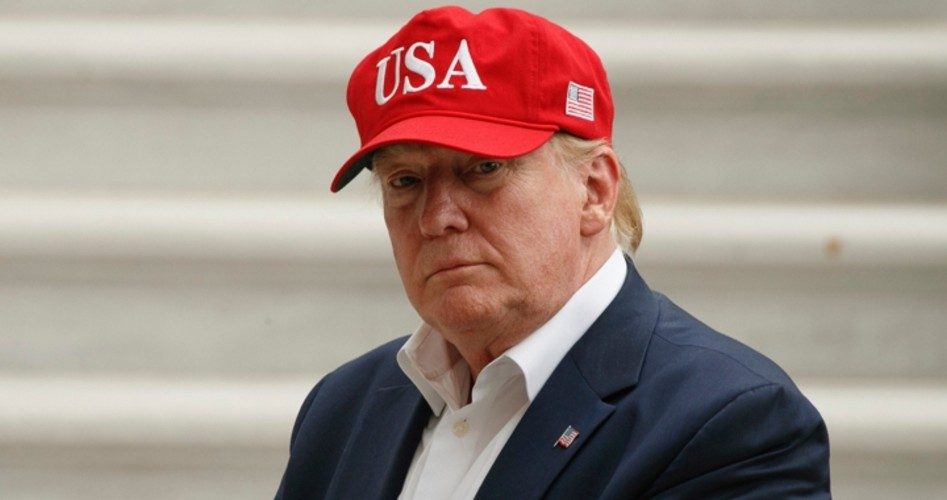
President Donald Trump announced on Friday in a tweet that he is suspending his plan to impose steep tariffs on Mexico, threatened in an effort to compel Mexico to stem the invasion of illegal migration into the United States through their country. Trump tweeted that Mexico “has agreed to take strong measures” to halt the use of their country as a highway into the United States for illegal immigration.
Trump tweeted, “I am pleased to inform you that the United States of America has reached a signed agreement with Mexico. Tariffs scheduled to be implemented by the U.S. on Monday, against Mexico, are hereby indefinitely suspended.”
According to Trump, Mexico has agreed it will do its best to “stem the tide of migration through Mexico and to our Southern Border.” Trump added that the concession by Mexico will “greatly reduce, or eliminate, Illegal Immigration coming from Mexico and into the United States.”
Earlier on Friday, it appeared that the 25-percent tariffs on Mexican goods coming into the United States would be imposed. Speaking for the White House, Sarah Sanders told reporters in Ireland, “Our position has not changed. The tariffs are going forward as of Monday.” The 25-percent increase would be phased in over time, with five-percent tariffs to take effect on Monday.
But the announcement on Friday ends the threat of tariffs on Mexico, at least for now.
According to a joint declaration released by the U.S. Department of State, the Mexican government has agreed to “unprecedented steps to increase enforcement to curb irregular migration.” One move that Mexico has agreed to take is the deployment of its National Guard not only on its southern border with Guatemala, but throughout Mexico. The State Department added that Mexico is taking “decisive action to dismantle human smuggling and trafficking organizations as well as their illicit financial and transportation networks.”
Trump said that Mexico will use 6,000 soldiers in its effort to control the tide of illegal migration through Mexico into the United States. “Mexico will try very hard,” Trump said, “and if they do that, this will be a very successful agreement for both the United States and Mexico!”
President Andres Manuel Lopez Obrador tweeted, “Thanks to the support of all Mexicans, the imposition of tariffs on Mexican products exported to the USA has been avoided.” A celebration is planned on Saturday in Tijuana.
The agreement followed several days of criticism of Trump’s threat to use tariffs to get the Mexican government to stop the invasion of migrant into the U.S., essentially unhindered by Mexico. It was not surprising that Trump’s threat to impose steep tariffs resulted in strong criticism by leading Democrats in Congress. House Speaker Nancy Pelosi (D-Calif.) responded that Trump’s “threats and temper tantrums are no way to negotiate foreign policy,” especially with “our close friend.”
Of course, Pelosi’s only expressed concern has been, not about the surge of illegal migrants and its effect upon the United States, but instead she has voiced her worries that Trump’s effort “violates the rights of asylum-seekers under U.S. law and fails to address the root causes of Central American migration.”
Senate Minority Leader Chuck Schumer (D-N.Y.), instead of praising Trump’s apparent win, chose to mockingly tweet the agreement as “an historic night,” adding, “Now that that problem is solved, I’m sure we won’t be hearing any more about it in the future.”
While one could have predicted that Schumer and Pelosi would have opposed Trump’s plan — they oppose everything Trump — the president even faced resistance within the Republican Party, especially from those members who worship at the altar of free trade. Multiple Republicans in Congress were publicly warning Trump that they would defy the policy and attempt to block implementation of the tariffs, expressing concern that the tariffs would raise costs to U.S. consumers, harm the economy, and possibly scuttle the USMCA (United States-Mexico-Canada Agreement) trade deal.
Scuttling the USMCA trade deal would have a huge victory for American national sovereignty, as the deal, if agreed to by Congress, would turn much of our nation’s independence to supranational bureaucrats set to enforce it. The deal would increase the push for a North American Union, much on the order of the European Union, where the member nations’ self-rule is drastically reduced.
In theory, trade can benefit both sides, but looking at Trump’s tariff gambit purely through the lens of final price levels to American consumers is terribly short-sighted. America must stop the flow of illegal crossings into the country, or cease to be a nation with a border. Trump is the first U.S. president since Eisenhower’s expulsion of foreigners from the country in the 1950s to seriously address the problem of illegal immigration. His critics chose to concentrate on the potential for damage to the U.S. economy, but apparently did not bother to even consider that Mexico needed trade with the U.S. more than the U.S. needed trade with Mexico.
And because of that, Trump was able to force Mexico to agree to finally do something about the waves of caravans freely crossing their country on their way to the United States.
Some have argued that the president should not be able to impose tariffs on his own, and constitutionally, they are correct. The Constitution does place international trade decisions in the Congress, but they (unconstitutionally) delegated that power to the president to make such decisions. Perhaps Congress will now rise up and take back the power they should have never delegated, because they don’t like Trump’s actions. (And while they are doing it, take back their power to declare war, rather than leaving it up to the president to make such serious decisions, on his own.)
Few Americans want to end all international trade, but making such trade a sacred cow, more important than any other policy concerns, like stopping the invasion of illegal migration, is wrong-headed. The Founding Fathers were almost uniformly in favor of taxes on imports — tariffs — and while Thomas Jefferson and Alexander Hamilton disagreed on many things, they did agree that tariffs, wisely employed, were good for the country.
In his 1998 book, The Great Betrayal, Pat Buchanan explained that our continued national sovereignty trumps the importance of free trade. “The most perilous aspect [of free trade] … is the loss of U.S. sovereignty and the potential loss of nationhood itself. Look at Europe. Nations there are meekly transferring control of their defense and foreign policy, of trade and immigration policy, to a super-state called the European Union; they are even giving up control of their currencies, which means control of their destinies. And what is happening to France, Britain, Germany, Italy, will happen here if we do not wake up. Once a nation has put its foot onto the slippery slope of global free trade, the process is inexorable, the end inevitable: death of the nation-state.”
Fortunately, in this case, a choice was made to put the welfare of our country over the devotion to the globalist free-trade agenda.
Photo of President Trump: AP Images



